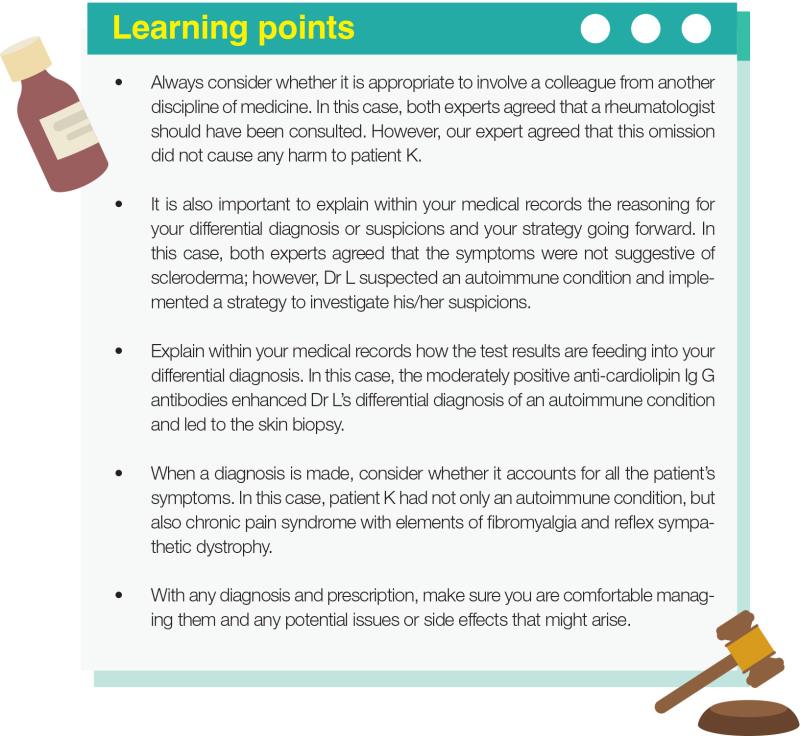Claim defended over alleged misdiagnosis





It is important for doctors to consider patient referral to an appropriate specialty when necessary. This article highlights doctors’ responsibility to explain the reasoning for differential diagnosis and future management strategies in medical records, with a case study illustrating how medical defence organizations may provide assistance.
Patient K presented to consultant nephrologist Dr L with a history of pseudo-seizures and reflux oesophagitis. An examination was performed, where patient K was noted as having a low-grade fever, oedema of the limbs, and a tender abdomen. Dr L diagnosed patient K with an infection.
Patient K returned to Dr L the next day and informed Dr L that he/she was also experiencing lethargy and lower limb discomfort and swelling. He/she informed Dr L that the symptoms were making it difficult for him/ her to mobilize. Dr L therefore decided to perform a number of tests, including autoimmune profiling. This came back with moderately positive anti-cardiolipin immunoglobulin (Ig) G antibodies. Dr L decided to perform a skin biopsy 2 days later. The biopsy was reviewed and the specimen was consistent with scleroderma. Dr L therefore prescribed mycophenolate mofetil.
Patient K returned to Dr L 2 months later, informing Dr L that the symptoms had worsened and that it was extremely difficult to mobilize due to the joint ache, stiffness and fatigue. Dr L decided to perform a second skin biopsy, which came back with the same conclusions as the first biopsy. Dr L therefore changed the prescription to rituximab.
Patient K’s symptoms did not improve. He/she therefore sought a second opinion and was diagnosed with chronic pain syndrome with elements of fibromyalgia and reflex sympathetic dystrophy.
Patient K brought a claim against Dr L, alleging that:
How did Medical Protection assist?
Dr L did not have any knowledge of a potential claim until he/she received a writ of summons and statement of claim. Upon receiving this, Dr L contacted Medical Protection, who immediately instructed local panel solicitors to file a defence on behalf of Dr L.
In addition, Medical Protection instructed the panel solicitors to obtain patient K’s medical records and a witness statement from Dr L. The evidence was reviewed internally by Medical Protection’s claims manager and medicolegal consultant, who agreed that further evidence was required. Medical Protection therefore instructed panel solicitors to obtain an expert report from a consultant rheumatologist. The expert supported Dr L’s diagnosis of the scleroderma and that the treatment was not unreasonable.
In order to support patient K’s position, his/her legal team produced an expert report from a consultant rheumatologist who took the position that:
Upon receiving the report, the content was discussed with our expert. He agreed that while symptoms were not suggestive of scleroderma, the biopsy results were definitive in their conclusions and therefore the diagnosis was correct. In addition, while the expert agreed that a rheumatologist should have been involved in patient K’s care, the expert accepted that Dr L had some experience of managing the condition and the medication prescribed. The prescriptions were therefore reasonable and did not result in any harm to patient K.
Medical Protection assessed the evidence and proceeded to defend Dr L at trial.
Outcome
The judge heard the conflicting evidence from the medicolegal experts and concluded that:
